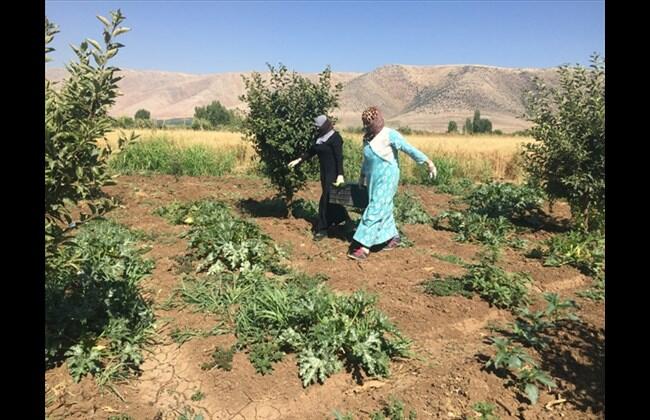The women would not have been able to cook hot meals for their families if it weren’t for the help of Lebanese NGO Intaliqi – Arabic for “set yourself free” – which works on empowering women through a series of skills-based programs. Intaliqi empowers marginalized women from Beirut to the Bekaa Valley, offering training, facilities and aid, helping them become more active and productive members of their communities. The organization was founded in 2013 by Zeina al-Zein and Lynn Tabbara. The pair said they shared a passion for helping women, and were already doing so on a personal level when they decided to found the NGO. The organization targets women who need help regardless of whether they are Lebanese, Syrian or Palestinian. In its first year, a small team from Intaliqi began working with vulnerable women in Beirut and at a Syrian refugee camp in Al-Aaqbiyeh, in the Zahrani district of south Lebanon. “We have a strong belief that a woman is always the shelter, for everyone,” Zein said. “She’s the house. She’s the shelter for her children, extended family, brothers, sisters and parents. A woman is always strong on so many levels.” Instead of being competitive with one another, women should help each other, Zein said. Through its relief work and training initiatives, the organization is working to foster such cooperation to help empower women. Though Intaliqi helps at-risk women from a variety of backgrounds, recently the organization has chosen to focus its limited funding on projects targeting Syrian refugees in the Bekaa Valley. Last December, harsh winter weather wrought havoc on the dozens of informal Syrian refugee camps scattered across the Bekaa. In response, Intaliqi sought ways to help some of the country’s most vulnerable people. Some women in the camps are widows, others have been traumatized after witnessing the death of family members, or have been otherwise affected by the ongoing war in their country. “In the Bekaa, [that] was our main shock,” Zein said. More than 30 refugee camps are now receiving aid from Intaliqi, including much-needed food and medical supplies. Intaliqi trains Syrian women in new skills, providing lasting benefits and allowing them to become more productive members of their communities. In turn, this can provide them with a new sense of confidence. In Majdal Anjar, the organization has leased a piece of farmland where up to 20 women from the nearby camps of Marj can work. The women learn how to plant and harvest crops, skills that are useful now, and could, in the future, provide them with a greater level of economic independence. The agricultural training is just part of a package of services the women receive from the NGO, which also includes yoga sessions and a medical checkup. Another skills-based program is the Ramadan Kitchen in Dalhamieh. Due to its early success, the Ramadan Kitchen project could continue long after the holy month comes to a close. The kitchen facilities, provided by Intaliqi, have everything needed to prepare the meal, including pots, serving spoons, cups and hygiene equipment. The hot meals prepared by the women are distributed in the camps where Intaliqi works. The three women made the kitchen their own, and Zein seemed proud of what the NGO has accomplished, both in terms of helping of others and providing the women with an outlet for their skills. Elham said she had learned how to prepare a variety of new dishes in the kitchen. “I proved [by] my presence that in this society, we have a role,”Umm Ammar said, when asked how the Ramadan Kitchen has helped her. Umm Ammar has been in Lebanon for two years. She said she wants to work, but opportunities are few. Zein stressed the importance of establishing such facilities within the camps, so women don’t have to worry about transportation or leaving their children and families. “I believe in training centers, but for the camps I prefer that the training centers not be far away, and I prefer that these places be in a safe zone for them” she said. “Let them start by working within the community.” With such limited opportunities for employment, such projects have helped fill the void in these women’s lives, Zein said, adding that they can also help reduce the number of marital disputes that arise as a result of couples being together all day. “I am very happy to see these problems decrease and that they do not come up [just] because someone is bored.” Intaliqi remains focused on helping all vulnerable women, and the organization is planning new projects for Lebanese women in the future. But for now, they are continuing their work in the Bekaa Valley to ensure that those they train can continue on independently, Zein said. “I want to make sure that the families we worked with are on their feet.”
Ghinwa Obeid| The Daily Star











